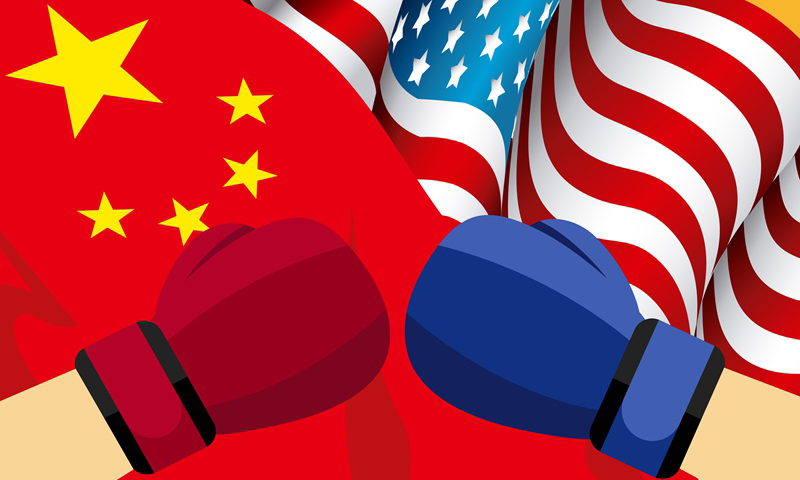China's biggest challenge will be balancing US ties amid high tensions
By Zhu Feng Source: Global Times Published: 2020/8/12 13:56:27

China US Photo: GT
Trump's suppression of China-US ties and hatred against China since the outbreak of the novel coronavirus are now blatantly challenging the value of free and open markets and the one-China policy. The game with the US will become China's most complex, acute and critical long-term strategic task in the future to maintain peace and development in the international order.
In terms of diplomacy, the more China focuses on the struggle with the US, the more it must take into account rationality and creativity in bilateral and multilateral relations with other countries - as well as with regional and global affairs.
Diplomacy is the "art of possibility," with an aim of reducing and avoiding conflict and confrontation among countries. It seeks to achieve strategic missions of peaceful development and sustainable growth with constructive and rational tools.
There are generally four major standards to measure whether a country's diplomacy is successful or not. First, the rationality of its goals and methods. Second, the continuity of the process in seeking its basic interests. Third, whether the country has reduced and controlled the threats to its national security. Fourth, the measurable influence of its diplomacy on its target countries.
Diplomatic missions need strong and multilateral support of both national and social strength.
A country's strong and comprehensive strength (including preparation for military conflict, economic construction, public opinion, innovation in science and technology as well as social sciences, etc.) is a solid backup force to guarantee diplomacy works.
China's rise as a major power is becoming an important factor for new reforms and adjustments in the international system and global order. A China which is becoming powerful is bound to compete with other countries over redistribution of power, interests and fortunes. This is determined by the nature of power politics in international relations.
The international system and global order in any era, after all, is determined by the structure and rules within which power, interests and fortune are distributed. The rise of China and newly emerging economies is triggering unprecedented changes in international patterns. But the strategic posture of the international system with a powerful West and relatively weak East has not fundamentally changed.
However, the unprecedented public health crisis has dramatically accelerated the historical redistribution of power in the international order.
As a result, the US' "China anxiety" has turned into "China hatred" due to the pandemic. Supremacy and fear now dominate the US election cycle with the Trump administration launching overbearing and reckless suppression against China in his "COVID-19 retaliation" campaign.
But the China-US relationship shouldn't be kidnapped by US right-wing forces. Trump's utmost need of reelection has overlapped with the US' China hawks' selfish desires to advance moves to suppress China. These anti-China politicians have torn off their so-called democratic and rule of law masks in an attempt to drag China into a new cold war.
However, the US is not solidly united as one. The rest of the world won't sit back and witness the deterioration of China-US ties. The Trump administration's hysteria over China has backfired within the US. At the same time, the hype of a new cold war is not being supported around the world.
China hasn't wanted to implement tit-for-tat measures in the face of Trump's anti-China campaign. Instead, it has refrained and instead given resolute responses which are responsible. This is in line with China's promise to maintain the world peace, prosperity, and stability.
Although Trump has signed orders to ban businesses with ByteDance, TikTok's parent company, and Tencent's WeChat, the Asian stock market continues to rise - the recovery of major regional economies is a rising trend now. This is directly related to China's reasonable and modest diplomatic moves in the struggle with the US.
Maintaining cooperation with the US amid this current strategic competition will be the largest challenge for China since the reform and opening-up began.
We must have a long-term vision and motivate Chinese society in this way. Perhaps it is this US wild pressure that is forcing China to mature more quickly as a major country.
The author is the executive director of the China Center for Collaborative Studies of the South China Sea at Nanjing University. opinion@globaltimes.com.cn
Posted in: VIEWPOINT